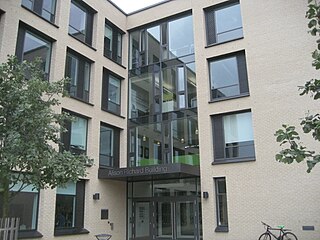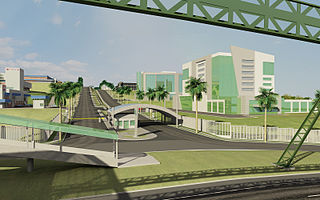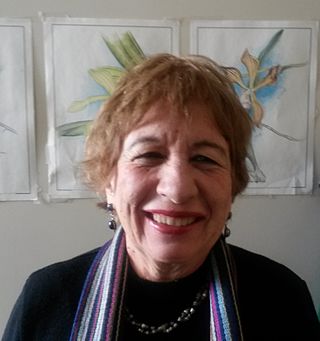
The U.S. National Science Foundation (NSF) is an independent agency of the United States federal government that supports fundamental research and education in all the non-medical fields of science and engineering. Its medical counterpart is the National Institutes of Health. With an annual budget of about $9.9 billion, the NSF funds approximately 25% of all federally supported basic research conducted by the United States' colleges and universities. In some fields, such as mathematics, computer science, economics, and the social sciences, the NSF is the major source of federal backing.

Science policy is concerned with the allocation of resources for the conduct of science towards the goal of best serving the public interest. Topics include the funding of science, the careers of scientists, and the translation of scientific discoveries into technological innovation to promote commercial product development, competitiveness, economic growth and economic development. Science policy focuses on knowledge production and role of knowledge networks, collaborations, and the complex distributions of expertise, equipment, and know-how. Understanding the processes and organizational context of generating novel and innovative science and engineering ideas is a core concern of science policy. Science policy topics include weapons development, health care and environmental monitoring.
The Joint Graduate School of Energy and Environment (JGSEE) (Thai: บัณฑิตวิทยาลัยร่วมด้านพลังงานและสิ่งแวดล้อม) is an autonomous graduate school, operating as a consortium of five Thai universities. Established in 1998, it aims to be an internationally recognized premier centre in graduate education and research in the fields of energy and environmental technologies. The school receives funding from the Thai government through the CHE–ADB Higher Education Development Project and the Energy Conservation Promotion Fund of Thailand's Ministry of Energy.

The Ministry of Education, Culture, Sports, Science and Technology is one of the eleven ministries of Japan that composes part of the executive branch of the government of Japan. Its goal is to improve the development of Japan in relation with the international community. The ministry is responsible for funding research under its jurisdiction, some of which includes: children's health in relation to home environment, delta-sigma modulations utilizing graphs, gender equality in sciences, neutrino detection which contributes to the study of supernovas around the world, and other general research for the future.

Science and technology in Brazil has entered the international arena in recent decades. The central agency for science and technology in Brazil is the Ministry of Science and Technology, which includes the CNPq and Finep. This ministry also has a direct supervision over the National Institute for Space Research, the National Institute of Amazonian Research, and the National Institute of Technology (Brazil). The ministry is also responsible for the Secretariat for Computer and Automation Policy, which is the successor of the SEI. The Ministry of Science and Technology, which the Sarney government created in March 1985, was headed initially by a person associated with the nationalist ideologies of the past. Although the new minister was able to raise the budget for the science and technology sector, he remained isolated within the government and had no influence on policy making for the economy.

The Centro Nacional de Tecnologia Electrônica Avançada S.A is a Brazilian technology center specialized in project development and fabrication in microelectronics, i.e. integrated circuits, or "chips". This center is one of the agents for the Brazilian Microelectronics Program.
The Framework Programmes for Research and Technological Development, also called Framework Programmes or abbreviated FP1 to FP9, are funding programmes created by the European Union/European Commission to support and foster research in the European Research Area (ERA). Starting in 2014, the funding programmes were named Horizon.
In many countries, the term principal investigator (PI) refers to the holder of an independent grant and the lead researcher for the grant project, usually in the sciences, such as a laboratory study or a clinical trial. The phrase is also often used as a synonym for "head of the laboratory" or "research group leader". While the expression is common in the sciences, it is used widely for the person or persons who make final decisions and supervise funding and expenditures on a given research project.
The military funding of science has had a powerful transformative effect on the practice and products of scientific research since the early 20th century. Particularly since World War I, advanced science-based technologies have been viewed as essential elements of a successful military.

European Grid Infrastructure (EGI) is a series of efforts to provide access to high-throughput computing resources across Europe using grid computing techniques. The EGI links centres in different European countries to support international research in many scientific disciplines. Following a series of research projects such as DataGrid and Enabling Grids for E-sciencE, the EGI Foundation was formed in 2010 to sustain the services of EGI.
The Research Council of Finland is a governmental funding body for scientific research in Finland. Until August 2023, its official English-language name was Academy of Finland. It is based in Helsinki. Yearly, the council administers over 260 million euros to Finnish research activities. Over 5000 researchers are working on projects supported by the council.

The Pontifical Catholic University of Rio Grande do Sul is a private non-profit Catholic university. With campuses in the Brazilian cities of Porto Alegre and Viamão, it is the largest private university of the state of Rio Grande do Sul and the first university founded by the Catholic religious institute of the Marist Brothers. PUCRS is considered the best private university of Brazil's Southern Region by the Ministry of Education (MEC), and one of the best private universities in the country, with FGV, PUC-Rio and the PUC-SP.

The Centre for Research in the Arts, Social Sciences and Humanities (CRASSH) is an interdisciplinary research centre within the University of Cambridge. Founded in 2001, CRASSH came into being as a way to create interdisciplinary dialogue across the University’s many faculties and departments in the arts, social sciences, and humanities, as well as to build bridges with scientific subjects. It has now grown into one of the largest humanities institutes in the world and is a major presence in academic life in the UK. It serves at once to draw together disciplinary perspectives in Cambridge and to disseminate new ideas to audiences across Europe and beyond.

The Department of Science and Technology (DST) is a department within the Ministry of Science and Technology in India. It was established in May 1971 to promote new areas of science and technology and to play the role of a nodal department for organising, coordinating and promoting scientific and technological activities in the country. It gives funds to various approved scientific projects in India. It also supports various researchers in India to attend conferences abroad and to go for experimental works.

The Vale do Sinos Regional Development Association, VALETEC, was established in 1998 as a non-profit private civil partnership at the Sinos River Valley in southern Brazil. Its goal is to promote technological development in the Vale do Sinos region by stimulating regional integration, providing incentives for entrepreneurship, while creating, attracting, hosting, and developing companies. In order to achieve this goal, VALETEC develops and manages environments for technological innovation, such as incubators, entrepreneurial condominiums, technology parks and complexes, as well as other initiatives aligned with this focus. VALETEC's main commitment is to contribute for the improvement of the Vale do Sinos quality of life, while forging links between educational and research institutions and the society, governments, and companies. This contributes to generate jobs and wealth, boosting the sustainable development of the Vale do Sinos technopolitan project.

The Ministry of Science, Technology and Innovation of Brazil is the civilian cabinet organization which coordinates science, technology, and innovation activities in the country. It is headed by the Minister of Science, Technology and Innovation.

University of Buea (UB) is found in Molyko, Buea, in the southwest region of Cameroon. It was founded as a university centre in 1985 and became a full-fledged university in 1992, following a government decree that re-organized state universities in the country. It is regarded as the best university in Cameroon and is one of two English speaking universities in Cameroon, alongside the University of Bamenda, which follow the British system of education. It serves citizens from both anglophone and francophone regions of Cameroon and from neighboring countries such as Nigeria and Equatorial Guinea.

Cristina Possas de Albuquerque is a Brazilian public health scientist working with infectious diseases and emerging infectious diseases from an eco-social perspective.

Innovation, Technology and Industry Bureau (ITIB) is one of the policy bureaus under the Government Secretariat of the Government of Hong Kong and is responsible for policy matters on the development of innovation and technology and information technology which are the key drivers in this endeavour. The Bureau is led by the Secretary for Innovation, Technology and Industry, currently Dong Sun.

Open access to scholarly communication in Austria has developed in the 2010s largely through government initiatives. The Austrian Science Fund and Universities Austria launched the "Open Access Netzwerk Austria" in 2012 to coordinate country-wide efforts. The "E-Infrastructures Austria" project began in 2014 to develop repositories. The international advocacy effort "OpenscienceASAP – Open Science as a Practice" is based in Austria.















